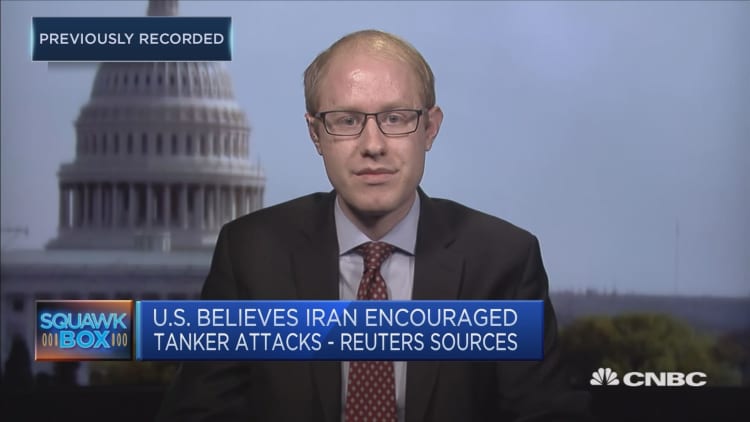
As U.S.-Iran tensions continue to escalate, there is rising fear among experts and government officials that a conflict between the two countries may break out.
According to Henry Rome, a global macro and Iran analyst at political risk consultancy Eurasia Group, the risk of miscalculation by Washington and Tehran is "real."
"If the U.S. and Iran were to end up in conflict in the near future, it will be because of a miscalculation or a misperception," he told CNBC.
While President Donald Trump and Iran's Supreme Leader Ali Khamenei have both said they are not interested in war, Rome said Thursday that "history has shown us that many, many times that even two states — uninterested in armed confrontation — can be drawn into it based on accidents, misperceptions or other provocations."
The Trump administration has deployed a carrier strike group and bombers to the Middle East region in response to what it calls "troubling and escalatory indications and warnings" from Iran.
Despite rising fears of how misunderstandings between the two countries could escalate into a full-blown conflict, U.S. Secretary of State Mike Pompeo told CNBC on Saturday that the U.S. is "not going to miscalculate." "Our aim is not war, our aim is a change in the behavior of the Iranian leadership," he said.
On Wednesday, the U.S. State Department announced that all non-emergency American staff on diplomatic missions will be pulled out of Iraq, citing concerns of threats from Iranian-backed forces.
Washington's decision, however, runs counter to remarks from a senior British military official on Tuesday— who said there has been "no increased threat from Iranian-backed forces in Iraq or Syria."
"The U.S. is having a credibility problem here in trying to convince its allies of the threats faced by Iran, largely because of its track record and the individuals leading it, namely (U.S. National Security Advisor) John Bolton," Rome said.
Still, Rome said the "vague" U.S. intelligence and lack of public confirmation of Iranian threats in Iraq doesn't mean that "we should reflexively reject these threats."
"The U.S. would take a decision to draw down embassy staff very seriously as the result of complex deliberations," Rome explained. "So I think we should read this as trying to minimize risk, yes, and also there is a real threat."
Iran 'left with no choice'
The U.S. decision to pull out its diplomats from Iraq comes on the back of increasingly provocative rhetoric between Washington and Tehran.
Washington has slapped sanctions on Iranian industrial metals and oil — the country's two largest sources of export revenue.
Iran announced last Wednesday that it intends to violate two provisions of a 2015 nuclear agreement — which the U.S. unilaterally pulled out of last year — and threatened other members of the agreement that it would restart part of its halted nuclear program if they did not resume oil trade within 60 days.
According to Rome, Tehran's pledge to violate some terms of the JCPOA agreement could easily reduce Iranian "breakout time" — the duration required to produce enough weapons-grade uranium for a nuclear weapon.
"The Iranians are trying to take this one step at a time, and they're really looking for excuses to stay in the confines of the agreement," Rome said.
"But after one year of staying inside of the JCPOA while the U.S. applied sanctions and cut off Iranian oil exports, from Iran's point of view they were left with no choice," he added.

